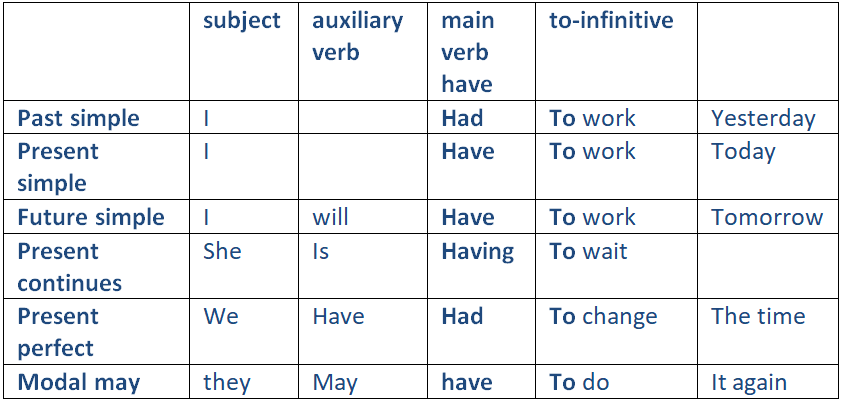


 Grammar
Grammar
 Tenses
Tenses
 Present
Present
 Past
Past
 Future
Future
 Parts Of Speech
Parts Of Speech
 Nouns
Nouns
 Verbs
Verbs
 Adverbs
Adverbs
 Adjectives
Adjectives
 Pronouns
Pronouns
 Pre Position
Pre Position
 Preposition by function
Preposition by function 
 Preposition by construction
Preposition by construction
 Conjunctions
Conjunctions
 Interjections
Interjections
 Grammar Rules
Grammar Rules
 Linguistics
Linguistics
 Semantics
Semantics
 Pragmatics
Pragmatics
 Reading Comprehension
Reading Comprehension|
Read More
Date: 13-6-2021
Date: 13-6-2021
Date: 13-6-2021
|
have to, must
Have to is NOT an auxiliary verb (it uses the verb have as a main verb). We include have to here for convenience.
Must is a modal auxiliary verb.
In this lesson we look at have to, must and must not.
have to for objective obligation
We often use “have to” to say that something is obligatory, for example:
Children have to go to school.
Note that we can use the have to expression in all tenses, for example: he has to, he had to, he has had to, he will have to
Structure of have to
Have to is often grouped with modal auxiliary verbs for convenience, but in fact it is not a modal verb. It is not even an auxiliary verb. In the have to structure, "have" is a main verb.
The basic structure for have to is:

Look at these examples in the Present Simple tense:

Use of have to
In general, have to expresses impersonal obligation. The subject of have to is obliged or forced to act by a separate, external power (for example, the Law or school rules). Have to is objective. Look at these examples:
In France, you have to drive on the right.
In England, most schoolchildren have to wear a uniform.
John has to wear a tie at work.
In each of the above cases, the obligation is not the subject's opinion or idea. The obligation comes from outside.
We can use have to in all tenses, and also with modal auxiliaries. We conjugate it just like any other main verb. Here are some examples:

must for subjective obligation
We often use must to say that something is essential or necessary, for example:
I must go.
Structure of must
Must is a modal auxiliary verb. It is followed by a main verb.
The basic structure for must is:

The main verb is always the same form: base
Look at these examples:

Like all auxiliary verbs, must cannot be followed by to. So, we say:
I must go now.
not I must to go now.
Use of must
In general, must expresses personal obligation. Must expresses what the speaker thinks is necessary. Must is subjective. Look at these examples:
I must stop smoking.
You must visit us soon.
He must work harder.
In each of the above cases, the "obligation" is the opinion or idea of the person speaking. In fact, it is not a real obligation. It is not imposed from outside.
It is sometimes possible to use must for real obligation, for example a rule or a law. But generally we use have to for this.
We can use must to talk about the present or the future. Look at these examples:
I must go now. (present)
I must call my mother tomorrow. (future)
We cannot use must to talk about the past. We use have to, to talk about the past.
must not for prohibition
We use must not to say that something is not permitted or allowed, for example:
Passengers must not talk to the driver.
Structure of must not
Must is an auxiliary verb. It is followed by a main verb.
The basic structure for must not is:

The main verb is the base verb.
We often contract must not to mustn't.
Look at these examples:

NB: like all auxiliary verbs, must CANNOT be followed by to. So, we say:
You mustn't arrive late.
not You mustn't to arrive late.
Use of must not
Must not expresses prohibition - something that is not permitted, not allowed. The prohibition can be subjective (the speaker's opinion) or objective (a real law or rule). Look at these examples:
- I mustn't eat so much sugar. (subjective)
- You mustn't watch so much television. (subjective)
- Students must not leave bicycles here. (objective)
- Policemen must not drink on duty. (objective)
We can use must not to talk about the present or the future:
Visitors must not smoke. (present)
I mustn't forget Tara's birthday. (future)
We cannot use must not to talk about the past. We use other structures to talk about the past, for example:
We were not allowed to enter.
I couldn't park outside the shop.
|
|
|
|
مخاطر عدم علاج ارتفاع ضغط الدم
|
|
|
|
|
|
|
اختراق جديد في علاج سرطان البروستات العدواني
|
|
|
|
|
|
|
مدرسة دار العلم.. صرح علميّ متميز في كربلاء لنشر علوم أهل البيت (عليهم السلام)
|
|
|